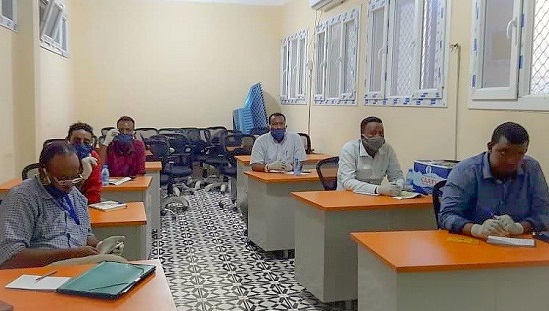UNODC Eastern Africa News and Stories
You are here: Home / News
Somali Police Force and UNODC deliver virtual investigation course

Mogadishu, 23 June 2020 - The Somali Police Force and UNODC have today concluded the first Pre-Basic Investigation Pilot Course (Pre-BIC) for six Somali Police Force officials at the Criminal Investigation Department (CID) in Mogadishu.
Due to the global COVID-19 pandemic, UNODC presented the four-week course via video conferencing.
Delivered as part of the UNODC Criminal Investigation Programme (CIP) for Somalia, funded by the US Department of State Bureau of International Narcotics and Law Enforcement Affairs (INL), the objective of the training course was to prepare the participants for the upcoming UNODC Investigation Development course, to be delivered over a period of three months.
The same foundational Pre-BIC will now also be presented in each of the Federal Member States.
The Pre-BIC utilized new UNODC training material specifically developed and translated into Somali to assist in the training of investigators across Somalia.
The training was conducted by a Somali trainer who successfully completed the initial three-week UNODC Training-of-Trainers Course in January 2020, supported by UNODC law enforcement mentors.
The Pre-BIC focused on principles of criminal investigations and the role of investigators, the Bill of Rights and Somali Provisional Constitution, rights and rules under the Somali Criminal Justice System and the importance of upholding human rights in investigations, the burden of proof and admissibility of evidence during investigations.
In addition, the course focused on investigating corruption and corruption-related cases.
The training curriculum also included hands-on exercises on sharing knowledge about criminal investigations, illustrating both the fundamentals and complexity of criminal investigations, while ensuring a strong victim-centred approach.
The Pre-BIC, which commenced on 1 June, was opened by the Acting Director of CID in Mogadishu, Colonel Gullied Shiekh,who thanked UNODC for the continued good cooperation: “This initiative will enhance the efficiency of investigators in the fight against crime in line with the existing Somali laws”.
In turn, UNODC Head of Office in Somalia and CIP Programme Coordinator, Ms. Amelia Hannaford, expressed UNODC’s appreciation to the Federal Government of Somalia and the US Department of State Bureau of International Narcotics and Law Enforcement Affairs (INL) for their continued support and partnership. Ms. Hannaford emphasized that the goal of the training was to increase the potential of the newly appointed CID investigators in dealing with various crimes in Somalia.
During the graduation and closing ceremony today (23 June), attended by Colonel Gullied, Ms. Hannaford and Senior Police Programme Advisor, Mr. Jim Strickland, representing INL, the Head of UNODC's Transnational Organized Crime, Illicit Trafficking and Terrorism Programmes in Eastern Africa, Mr. Johan Kruger, congratulated the participants on successfully concluding the four-week course. He also thanked Colonel Gullied and the Federal Government of Somalia for their commitment in implementing the CIP.
Mr. Kruger expressed UNODC’s gratitude to the US Government and INL for funding but also supporting the programme on a day-to-day basis: “Our assistance to Somalia, made possible by the financial support received from the US Government through INL, is a top priority for UNODC in Eastern Africa. Every criminal investigator who is trained and equipped, further contributes to protecting the people of Somalia from criminals seeking to profit from serious and organized crime”.
More information
The CIP for Somalia is being implemented within the framework of the UNODC Regional Programme for Eastern Africa (2016-2021) and its regional Countering Transnational Organized Crime and Illicit Trafficking Programme.
Its objective is to enhance the investigation capacity of the Somali Police Force, at the Federal and Federal Member State level, by supporting specialized investigation units and by developing and enabling a group of investigators to investigate serious and organized crime in accordance with international treaty obligations and standards.